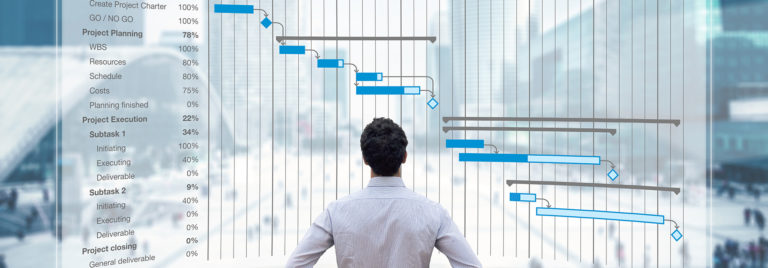At first glance, the terms project planner and project manager may seem synonymous, but the reality is quite different. In fact, each occupies very distinct functions. In this article, we will look in detail at the role and responsibilities of each and how they complement each other.
Definition of a project planner
Project planning is the basis of project management. Every good project needs to be planned and coordinated to ensure that it runs smoothly and achieves its objectives. Project planning comes into play at the very beginning of a project.
The skills of a good project qualifier
The project qualifier must be an excellent communicator with employees and stakeholders, as they initiate the project planning and are the foundation of the project. This means sharing essential information in the right way to keep the project moving in the right direction.
Steering and organisation are also two key skills, particularly for complex projects involving many different players and resources. This must be combined with a good ability to summarise.
The planner also has the technical skills to master project management tools such as Primavera P6, Trello and MS Project. They are familiar with project management processes and best practice.
Definition of the project manager
The project manager is involved in the most strategic part of the project and is responsible for the overall success of the project. They play a major role, that of “orchestra conductor”. Their responsibilities are very wide-ranging, and they need to be present throughout the project life cycle. It is up to the project manager to ensure overall coordination of the project (deadlines, budget, quality and performance), to define the main objectives and to ensure the execution, monitoring, control and closure of the project. They work closely with the project team and stakeholders to coordinate everyone’s tasks and allocate the necessary resources.
The project manager is truly involved at an operational level. One of their major roles is risk management: they have to assess risks using a risk scale and matrix, then manage and, above all, monitor them. The project manager is in a more leadership position than the project planner, even though they work together on large-scale projects. They have to make strategic decisions.
The skills of a good project manager
The project manager must have excellent human and interpersonal skills, such as leadership and communication – two essential qualities. It’s up to them to mobilise their team and deliver the key elements.
The project manager must have a global vision that extends beyond the deliverables.
The project manager must also be able to delegate certain tasks to the project planner so that they can concentrate on the more strategic tasks of supervision and monitoring.
Project planner and project manager, two complementary roles
The project planner plans, and the project manager manages… Sometimes the project manager takes on these two roles, but depending on the complexity of the project it is strongly recommended that two people be called in to take on these different responsibilities.
In a nutshell...
The project planner works in coordination with the project manager and will be responsible for planning, scheduling, estimating the budget and monitoring these three activities, as well as the project management plan and risk management. Broadly speaking, they can be considered as the person responsible for managing the project’s deadlines and schedule.
The project manager, on the other hand, is a leader who is responsible for directing the project team in charge of producing the deliverables. The project manager “supervises” the project: they launch, execute, control and close it. It is also up to them to manage conflicts, within the project team, but also between stakeholders and the customer, for example.
Although there is no “obligation” to call on the services of a project planner, it is important to bear in mind that the role of the planner is complementary to that of the project manager, who is entrusted with significant responsibilities. In a complex project, the planner helps to relieve the project manager by delegating tasks related to controlling deadlines, proposing mitigation plans, setting up progress and associated reporting, etc. The role of the project planner can therefore be a major one, helping to ensure that the project runs smoothly and achieves its objectives.
Project planning with PROPRISM
Project planning is therefore a crucial stage in ensuring the smooth running and success of a project. It enables all the actions that will be undertaken to be structured and organised, the deliverables to be defined, the resources and risks to be managed, and the progress of the project to be monitored regularly. With rigorous planning, it is possible to optimise project progress, meet deadlines and achieve objectives.
However, companies and organisations do not always have the time or skills needed to carry out effective project planning. PROPRISM thus offers support to companies in the planning of their project, to ensure excellent control of the constraints to be met (deadlines, costs and scope) as well as better monitoring throughout the process.




